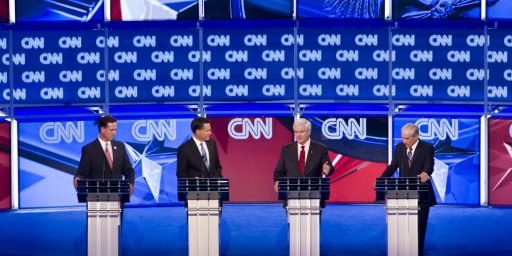Santorum Backing Off Nuclear Option
Santorum reads nuke polls, applies the brakes (The Hill)
Sen. Rick Santorum (R-Pa.), a leading advocate of the “nuclear option†to end the Democrats’ filibuster of judicial nominees, is privately arguing for a delay in the face of adverse internal party polls. Details of the polling numbers remain under wraps, but Santorum and other Senate sources concede that, while a majority of Americans oppose the filibuster, the figures show that most also accept the Democratic message that Republicans are trying to destroy the tradition of debate in the Senate.
The Republicans are keeping the “nuclear†poll numbers secret, whereas they have often in the past been keen to release internal survey results that favor the party. David Winston, head of the Winston Group, which conducts Senate GOP polls, did return phone calls seeking comment. Confirming public disquiet over the “nuclear†or “constitutional†option, Santorum said, “Our polling shows that.†But, he added, public thinking had been muddied by what he called false Democratic arguments that checks and balances were being eroded. “People see checks and balances as Democrats checking Republicans, not the legislative checking the executive or the judiciary checking the legislative,†Santorum said. Filibustering presidential nominees was not something the Founding Fathers envisioned as a tool for balancing power between the branches, he argued. In other words, Democrats have managed to convince the public of their right to check Republicans in the Senate.
Santorum’s raising of reasons that Republicans should delay the constitutional option may surprise conservative activists who count him as one of the most passionate advocates for the tactic in the Senate. “There is no doubt that Santorum was the backbone of this from the very beginning, and he continues to be,†said Manuel Miranda, head of the National Coalition to End Judicial Filibusters, an alliance of more than 200 conservative groups working on the judges issue.
The Republicans are right on the issue–the vast majority of Americans support the idea that the president’s nominees should get an up-or-down vote–but they’ve done a poor job of making their case. The Democrats have tradition on their side here and they’ve bolstered their position by getting the pejorative description “nuclear option” to stick.
While I disagree with Kevin Drum that the Republicans have “overreached,” he’s right that they have made numerous tactical errors and have been heavyhanded (not to mention hamfisted) in handling certain issues, notably the whole Tom Delay mess. Markos Zuniga is right, too, that Santorum’s tight re-election polls are as relevant to this as the fillibuster polls.
Ed Morrissey is disgusted with the Republicans for having “taken a significant mandate from the November 2004 election to break the unprecedented filibusters on judicial nominations and turned it into a liability.” It’s not clear, though, how much of a mandate on this issue the GOP had. While the die hards among us found it important, I’m not aware of any evidence that it was a major factor in Bush’s win over Kerry, let alone in the 435 House races or 34 Senate races in 2004. Such things are decidely inside baseball.
Paul Mirengoff hits the nail on the head:
[P]oll-based fear should not deter the Republicans in this instance. It also occurs to me that if the Republicans could make the Democrats actually filibuster Owen or Brown for an extended period, the public would conclude (a) that the Dems have had their opportunity for full debate and/or (b) that such debate, when undertaken by the Democrats, isn’t all it’s cracked up to be.
Right now, the Democrats are able to sell this as a fairness/balance issue. Making them actually go through with the messy business of shutting down the Senate to stop nominees that would appear reasonable to most people may well turn that around.
Steven Taylor adds that this would seem to belie the idea that interest groups dominate the agenda and Members ignore the public.






Nuke ’em! If the Dems insist on using the filibuster to prevent an up or down vote, then the “nuclear” option should be invoked.
Ahhhh, nuking democrats. Has a nice ring.
even if santorum votes against the nuke option he will still lose his senate seat next year.
i have an idea install the 65 bill clinton nominees the gop stalled and well talk about bushes 10.
Here’s a thought: amend the Constitution to require a Senate supermajority (3/5, 2/3, whatever) in confirming appointments to our lifetime judiciary. That way, neither party is likely to be able to push a candidate who’s not broadly attractive. Given the power of our judges, it’s probably a good idea to make their appointment depend on more than a 50%+1 vote.
…the 65 bill clinton nominees the gop stalled…
Every one of whom got an up-or-down vote on the Senate floor. They were rejected, not stalled.
[/elementary history lesson]
Your said “While the die hards among us found it important, I’m not aware of any evidence that it was a major factor in Bush’s win over Kerry, let alone in the 435 House races or 34 Senate races in 2004. Such things are decidely inside baseball.”
My question to you is, do you think Tom Daschel would agree with that assessment?”
Do the Dems disagree with McGehee?
I don’t know about the 65 in question, but it certainly appears that the Republicans have not, in fact, consistently maintained that a President’s nominee is entitled to a floor vote.
If they didn’t get a floor vote, it was because the committee rejected them. That website may say “their hearings were rejected” but that is obviously somebody who lacks sufficient facility with the English language to describe what actually happened.
What’s happening here is that the committee approves the nominees and they’re still not getting a floor vote.
Nice try, Anderson, but these hairs are too fine to split.
There is a difference between being rejected in committee and being approved by the committee. And in case anyone forgot, when the dems were in charge after Jeffords decided to change parties, the DNC was holding up nominations in committee.
Amen, McGehee: “obviously somebody who lacks sufficient facility with the English language to describe what actually happened.”
— …”but their nominations were defeated because their hearings were rejected by Republicans.” This is from the Democratic Policy Committee website? Is this the best expository writing they can muster?
“Their hearings were rejected.” Embarrassing.
Guys, guys, guys… think about this.
Remember the Clinton impeachment? Who could have guessed that could be spun by the media into a GOP defeat? The 1995 gov’t shutdown? The Balanced Budget Amendment? Terri Schiavo? Every other controversial issue the Republicans ever went to the mat on?
WE NEVER WIN PUBLIC OPINION ON THESE FIGHTS. EVER. EVER.
The LLL media still control the tone. Any story that is unclear will be spun hard left all over the country. Most people still have only a vague idea what a filibuster is even for. Dems’ sound bites will be reported as fact: “nuclear option,” “minority rights,” “defending checks and balances.”
Here’s something else indicative of what I’m talking about. Substitute Bush for Clinton and there would be an impeachment.
http://www.dailypundit.com/newarchives/001199.php#001199
Keep in mind, it’s only because of the Powerline and LGF blogs that we did not see John Kerry elected president because of a 60 Minutes story based on fake memos that claimed to show Bush shirked his National Guard duties. It only had to push the election a couple points toward the left to do so.
If they push this through, we’ll be inundated by media stories all through 2006 claiming Democrats are “defending the Constitution” and all the other sound bites I mentioned, plus a dozen more we haven’t heard yet. The media will ask rigged poll questions like “Are you in favor of checks and balances” to show people support the Dems’ position. Yes, you and I know how ridiculous all that is, but most people don’t.
Doing this will cost the GOP seats. Maybe even the majorities.
OTOH, not doing it may have future benefits. Think about it: Once this precedent is set, it will be inpossible for Dem presidents to nominate all the crazy liberal judges they’ve been sending to fed courts. And if we can get 58-61 votes in the Senate (not that unlikely due to demograhic trends, absent a Dem/MSM rallying point) it becomes nearly moot for the GOP. Plus, this way we get the rallying poin(t.
repost from AOS)